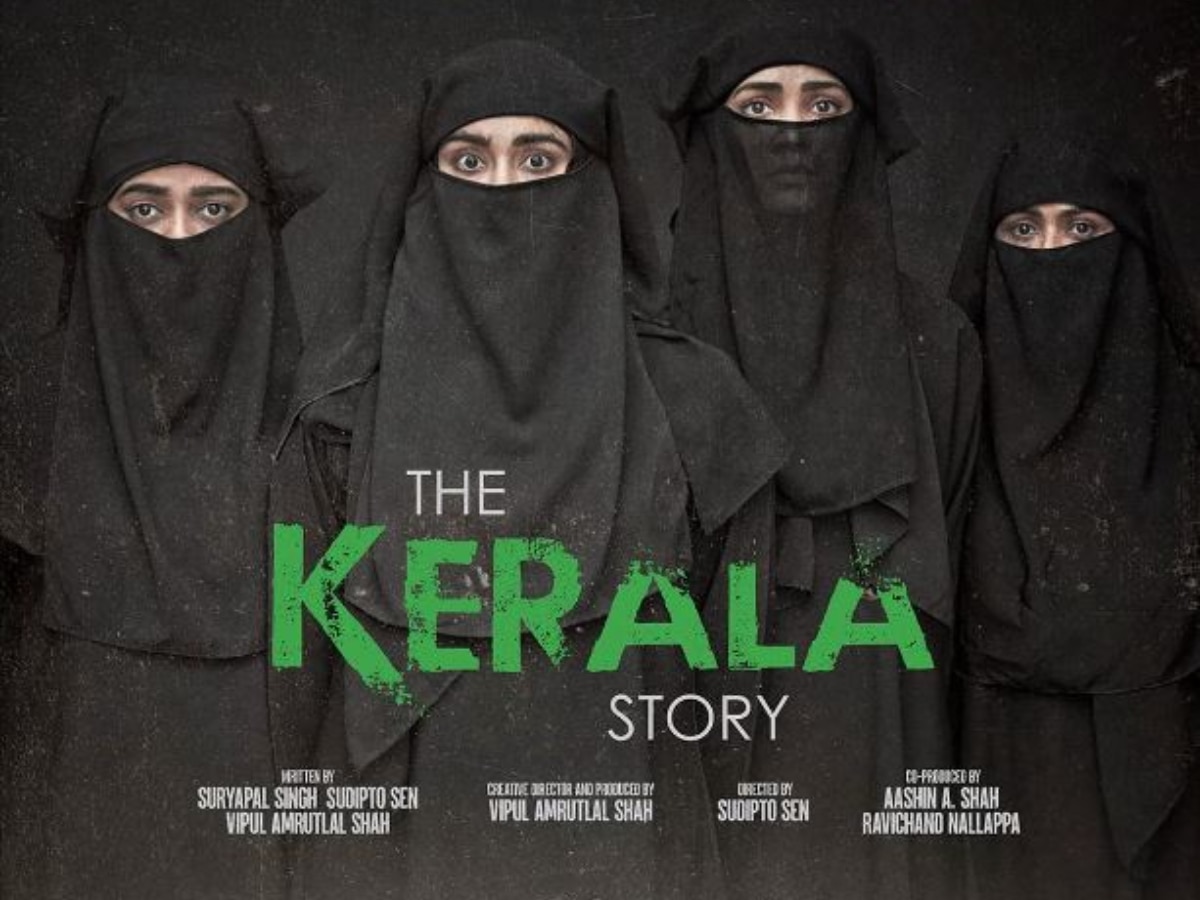New Delhi: How do you critique a film which documents the story of people affected by a contentious socio-political crime and controversy around its subject matter? 'The Kerala Story' is a feature film inspired by true events in the state of Kerala. It reimagines the plight of three women affected by such incidents( love-jihad, brutal inhuman crimes such as rape, sex slavery, radicalisation, indoctrination, and ISIS recruitment etc) in a quite innocent looking town of Kasaragod, Kerala. Thus, for obvious reasons, the writer is not going to critique or review 'The Kerala Story' from a context point of view.
The film stars Adah Sharma, Yogita Bihani, Sonia Balani, and Siddhi Idnani in the lead. 'The Kerala Story' begins with an opening sequence of a bruised Adah Sharma at a UN detention centre, who during interrogation recollects how she landed up as a trained ISIS terrorist. From the sandy terrains of Afghanistan, Pakistan, the film shifts to the green landscape of God's own country: Kerala.
The opening credits song quickly introduces audiences to the backstory of the lead character Adah Sharma (Shalini Unnikrishnan aka Fatima) who joins a nursing college in Kasargod, where she meets two more girls who are brainwashed into converting to Islam. What ensues along with this, is what 'The Kerala Story' is about.
'The Kerala Story' follows a documentary feature format and thus a lot of back and forth movement between the past and present, and between landscapes. The tone of past and present is differentiated with the music, camera movement and colour palette: brown and dry scales for the present while a lot of rich colours imbue the past, also signifying the state of minds of characters and their situations, the pain and suffering of the past and the youthful exploration in the present.
There is a lot of quick movement in the West Asian terrain and a lot of cards mentioning the exact places where ISIS hideouts etc. are. With the use of sharp cuts in the edit, this effect of buildup and suspense is very-well achieved.
'The Kerala Story', in that regard, is very-well cut. The parallel storylines of past and present is pretty well-balanced with the makers sometimes extending scenes and sequences of brutal violence, rape and exploitation to hit home the agony of the women affected by it. A lot of closeups are also used in the present storyline when their situations in life have worsened and the aftermath, severe, verses when all was all in the past. In the past storyline, a lot of mid shots and long shots, to reveal the overarching environment's affect on the lead characters, are used.
The screenplay of 'The Kerala Story' is also quite engaging and keeps you hooked until the end of the film. This dramatization of the lives of the three leads and the constant buildup until the release at the end of the film follows the three-act structure well.
'The Kerala Story', in this regard, does not experiment a lot with the narrative structure. It is more concerned about revealing the story in a particular fashion so as to make people aware. When information dissemination with the motive of educating the audience happens through a film, it becomes a different kind of cinema. Especially when the portrayal of different communities is involved...
As for performances, Adah Sharma, Yogita Bihani, Sonia Balani, and Siddhi Idnani are all spot on and deliver commendable performances.
'The Kerala Story' is also quite thematically rich. There is quite a lot of challenging Hindu religious worship, atheism, communism, and the process of indoctrinating Islam and Sharia law shown in the film which could raise quite another level of debate. The film also shows in a brutally honest light -- extremes of toxic masculinity, the vibe of innocence and the effects of company influence in tender years plus some ideological debate, but in a very mild and logical manner so as to not make the whole brainwashing process look rather inevitable.
However, one thing that really irks about 'The Kerala Story' is its background score. That is quite deafening. It is almost in the face of narrative. For instance; everytime, a brainwashing session about the 'helpless' Hindu gods is happening or the talk of 'hell fire' etc., you can literally hear the sound of lashes in the background. That almost interrupts the narrative besides amplifying the effect which could be conveyed without that kind of musical element.
The direction by indie-filmmaker Sudipto Sen in his first mainstream film is commendable though the documentary element is quite established and evident in 'The Kerala Story' as well. The organic linking of music into the narrative could have been better as could the dialogue which is rather typical and cliche ; for instance, everytime Kerala is called 'God's own country'. Other than that, ‘The Kerala Story’ could also balance out the portrayal of violence and sexual exploitation of all levels to widen its audience base.
Since, the attempt is earnest and the research there( despite all the contention), 'The Kerala Story' is worth a watch.


